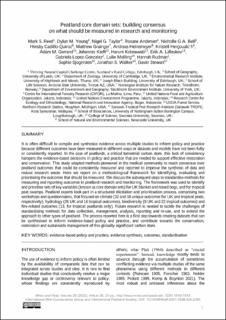Peatland core domain sets: building consensus on what should be measured in research and monitoring
Reed, Mark S.; Young, Dylan M.; Taylor, Nigel G.; Andersen, Roxane; Bell, Nicholle G.A.; Cadillo-Quiroz, Hinsby; Grainger, Matthew; Heinemeyer, Andreas; Hergoualc’h, Kristell; Gerrand, Adam M.; Kieft, Johannes; Krisnawati, Haruni; Lilleskov, Erik A.; Lopez-Gonzalez, Gabriela; Melling, Lulie; Rudman, Hannah; Sjogersten, Sophie; Walker, Jonathan S.; Stewart, Gavin
Peer reviewed, Journal article
Published version

View/
Date
2022Metadata
Show full item recordCollections
- Publikasjoner fra CRIStin - NINA [2364]
- Scientific publications [1392]
Original version
10.19189/MaP.2021.OMB.StA.2340Abstract
It is often difficult to compile and synthesise evidence across multiple studies to inform policy and practice because different outcomes have been measured in different ways or datasets and models have not been fully or consistently reported. In the case of peatlands, a critical terrestrial carbon store, this lack of consistency hampers the evidence-based decisions in policy and practice that are needed to support effective restoration and conservation. This study adapted methods pioneered in the medical community to reach consensus over peatland outcomes that could be consistently measured and reported to improve the synthesis of data and reduce research waste. Here we report on a methodological framework for identifying, evaluating and prioritising the outcomes that should be measured. We discuss the subsequent steps to standardise methods for measuring and reporting outcomes in peatland research and monitoring. The framework was used to identify and prioritise sets of key variables (known as core domain sets) for UK blanket and raised bogs, and for tropical peat swamps. Peatland experts took part in a structured elicitation and prioritisation process, comprising two workshops and questionnaires, that focused on climate (32 and 18 unique outcomes for UK and tropical peats, respectively), hydrology (26 UK and 16 tropical outcomes), biodiversity (8 UK and 22 tropical outcomes) and fire-related outcomes (13, for tropical peatlands only). Future research is needed to tackle the challenges of standardising methods for data collection, management, analysis, reporting and re-use, and to extend the approach to other types of peatland. The process reported here is a first step towards creating datasets that can be synthesised to inform evidence-based policy and practice, and contribute towards the conservation, restoration and sustainable management of this globally significant carbon store. evidence-based policy and practice, evidence synthesis, outcomes, standardisation
